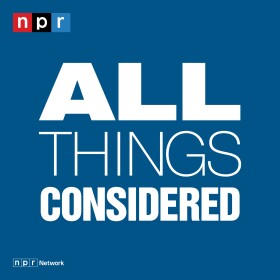
On May 3, 1971, at 5 pm, All Things Considered debuted on 90 public radio stations.
In the more than four decades since, almost everything about the program has changed, from the hosts, producers, editors and reporters to the length of the program, the equipment used and even the audience.
However there is one thing that remains the same: each show consists of the biggest stories of the day, thoughtful commentaries, insightful features on the quirky and the mainstream in arts and life, music and entertainment, all brought alive through sound.
More information about All Things Considered is available on their website.
All Things Considered is the most listened-to, afternoon drive-time, news radio program in the country. Every weekday the two-hour show is hosted by Ailsa Chang, Scott Detrow, Mary Louise Kelly, and Juana Summers. In 1977, ATC expanded to seven days a week with a one-hour show on Saturdays and Sundays, currently hosted by Michel Martin.
During each broadcast, stories and reports come to listeners from NPR reporters and correspondents based throughout the United States and the world. The hosts interview newsmakers and contribute their own reporting. Rounding out the mix are the disparate voices of a variety of commentators.
All Things Considered has earned many of journalism's highest honors, including the George Foster Peabody Award, the Alfred I. duPont-Columbia University Award and the Overseas Press Club Award.
-
In many ways, the conflict between Iran and the U.S. and Israel has been decades in the making. Ramtin Arablouei, host of NPR's podcast "Throughline," explains how.
-
Sen. Mark Warner, Democrat of Virginia and the ranking member of the Senate Intelligence Committee, talks about his response to U.S. strikes on Iran.
-
The U.S.-Israeli war with Iran, a major oil producer, threatens to impact oil and natural gas markets worldwide.
-
The Iranian diaspora in Los Angeles has celebrated the Trump administration's strikes against Iran, but some have mixed feelings.
-
Seth Jones of the center for Strategic and International Studies talks about the U.S military's capacity to carry out extended strikes in Iran, and Iran's ability to retaliate.
-
Esmail Baghaei, spokeman for Iran's Foreign Ministry, talks about his country's response to U.S. and Israeli airstrikes.
-
Caught in controversy, Republican Rep. Tony Gonzales faces a tough primary challenge as his voters weigh whether to back him again in Tuesday's primary.
-
Three U.S. service members have been killed in ongoing operations in the Middle East, as U.S. and Israeli strikes continue to hit Iran and Iran responds with waves of missiles and drones across the region.
-
What are people in Iran saying about today's attacks by the U.S. and Israel? We hear from people on the ground who experienced the event as it unfolded.
-
NPR's Emily Kwong speaks to House Minority Leader Hakeem Jeffries (D-NY), who is still calling for a vote on a war powers resolution following a wave of U.S.- and Israel-led airstrikes on Iran.


